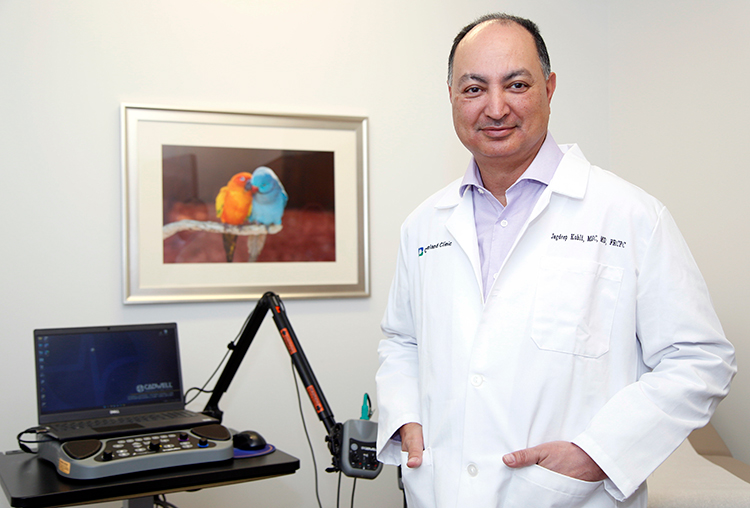
It starts with a sensation of pins and needles or numbness in your hands and feet. It may progress to a sharp, jabbing, burning pain and spread upward into your arms and legs. You may even feel like you are walking on marbles or wearing socks or gloves when you are not.
All of these are symptoms of peripheral neuropathy – nerve damage that causes pain and numbness as well as lack of coordination and muscle weakness.
“There are hundreds of causes of neuropathy,” said Dr. Jagdeep Kohli, a board-certified neurologist with Cleveland Clinic Indian River Hospital. “The most common cause in the Western world is diabetes, but it can also result from injuries, infections and exposure to toxins.
“Neuropathy is extremely common. In people 50 years of age and older, about 25 percent will experience symptoms, and those over 75 years of age have a 50 percent chance of getting the disease. When we see it in younger people it’s usually due to genetic causes or more unusual things like HIV, medication-induced or nutritional imbalance.”
Since there are so many causes, the physician plays detective in narrowing down the list of possible causes for his patient.
Dr. Kohli said he looks at family history because there is a genetic connection to the disease. One way to tell if you have that genetic predisposition to is to wiggle your feet. If you have high arches or hammer toes and are having trouble walking, that is a strong clue that it is genetic neuropathy. He’ll also ask about drinking habits because there is a strong link between alcohol use and neuropathy. He looks at routine labs and blood work. He might even find a clue on the patient’s skin or nails during a physical examination. It’s an intensive diagnosis and, in spite of all the tests and examinations, 30 percent of patients never have the underlying cause discovered.
The Mayo Clinic cites many health conditions that can cause neuropathy. Diabetes is the most common cause with more than half of diabetic patients developing some type of neuropathy.
Infections like hepatitis B and C, shingles, Lyme disease, diphtheria and HIV also are primary causes of neuropathy. Certain autoimmune diseases like lupus, rheumatoid arthritis and Guillain-Barre syndrome can also be culprits. Kidney and liver disease, hypothyroidism and connective tissue disorders are known causes, as are cancerous tumors that press on the nerves.
Alcoholism, certain medications, injuries, exposure to toxins, and vitamin deficiencies can all lead to neuropathy.
“It’s such a difficult disease to treat because the treatment is based on the cause and the cause is not always discoverable,” Dr. Kohli explained.
“If we find a cause, we focus on treating that. For example, if we find that the patient is diabetic, then we treat the diabetes. If we find that the patient has a vitamin deficiency, we focus on replenishing that vitamin. If the patient has a high alcohol intake, we limit it. Sometimes neuropathy is a side effect of chemotherapy so we may have to reduce the dosage. If we find the cause, we can find the cure. Aside from directly treating the cause to reverse the nerve damage, all we can do is treat the pain and condition the muscles.”
Early diagnosis and treatment offers the best chance for controlling symptoms and preventing further damage to your peripheral nerves.
“People have to understand that if they are having abnormal sensations in the feet, it needs to be checked out rather than ignored,” Dr. Kohli said. “Neuropathy can be very serious, and it will progress if untreated. Many people try to self-diagnose and pass it off to ill-fitting shoes or such.
Some even visit a podiatrist, but a podiatrist may not recognize it as neuropathy.
“It’s best to get it evaluated properly by a family doctor to make sure you are not diabetic or pre-diabetic, that your thyroid is under control and that you don’t have any vitamin deficiencies.
Your primary care doctor will identify the symptoms and refer you to a neurologist if necessary.”
There is no miracle surgery that can cure neuropathy, but for many people lifestyle changes and management are successful in slowing the progression of the disease. Losing weight, exercising, monitoring blood sugar levels, not smoking, limiting alcohol, improving vitamin deficiencies, and making sure injuries and infections don’t go untreated are all keys to managing neuropathy.
For some, wearing orthopedic braces to compensate for weakness and balance loss, or using a cane or walker to reduce the risk of falling will help. Working with a physical therapist can help you walk safely again.
Still, the most important thing you can do is to see your doctor to seek a diagnosis and discuss your care plan with the aim of managing symptoms, reducing pain and getting back to enjoying life again.
Dr. Jagdeep Kohli completed his medical education at the University of Calgary followed by an internship at the University of New Mexico and his residency at Mayo Clinic in Rochester, Minn.
He recently joined Cleveland Clinic Indian River Hospital and is seeing new patients at his office in the Health and Wellness Center, 3450 11th Court, Suite 305B, Vero Beach. Call 772-770-6848 for an appointment.



